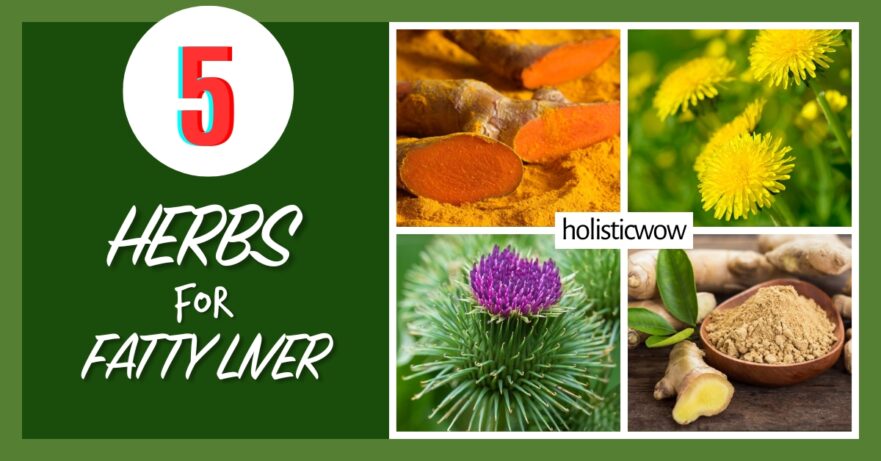In this article about herbs for fatty liver:
🌿 Best Herbs for Fatty Liver | 📜 Herbal Preparations and Recipes for Fatty Liver Support | ☯️ Integrating Herbs into Daily Life | 🌱 Navigating Herbs Safely
Fatty liver disease is when excess fat accumulates in liver cells, often without noticeable symptoms initially. As it progresses, it can lead to fatigue, abdominal discomfort, and potentially severe liver damage if left untreated.
Certain herbs show promise in supporting liver health and potentially reducing fat accumulation. Turmeric, milk thistle, and dandelion root are traditionally used to improve liver function and decrease inflammation associated with fatty liver disease.
Understanding these herbs’ potential benefits and proper usage is crucial for those seeking natural support for liver health. The following sections will explore each herb’s properties and how they may contribute to managing fatty liver disease.
Key Takeaways
- 🌿 Potent Liver Herbs: Turmeric and milk thistle show potential in supporting liver health and reducing inflammation, with some evidence suggesting they may help reduce liver fat in fatty liver disease.
- 🍵 Detoxifying Dandelion: Dandelion root supports liver health by promoting bile production, which may aid digestion and detoxification.
- 🫚 Ginger’s Dual Action: Ginger may improve insulin sensitivity and reduce liver enzymes, benefiting those with fatty liver.
- ✨ Antioxidant Burdock: Burdock root’s antioxidant properties may support overall liver health, though most evidence comes from traditional use and animal studies.
- 🍏 Holistic Approach: Combining herbal remedies with a balanced diet and regular exercise provides comprehensive support for managing fatty liver disease.
🌿 Best Herbs for Fatty Liver
Fatty liver disease is a condition where excess fat accumulates in liver cells. Turmeric (Curcuma longa), milk thistle (Silybum marianum), dandelion root (Taraxacum officinale), ginger (Zingiber officinale), and burdock root (Arctium lappa) are herbs traditionally used to support liver health.
Fatty liver disease often develops without noticeable symptoms, making it challenging to detect in its early stages. However, as the condition progresses, some people may experience fatigue, weakness, and discomfort in the upper right abdomen. In more advanced cases, the liver may become enlarged, leading to a feeling of fullness or heaviness in the abdomen.
The most common form of fatty liver disease is non-alcoholic fatty liver disease (NAFLD), which is not related to excessive alcohol consumption. NAFLD is closely linked to obesity, insulin resistance, and type 2 diabetes. Other risk factors include high cholesterol, high blood pressure, and metabolic syndrome.
In some cases, fatty liver can progress to non-alcoholic steatohepatitis (NASH), a more severe form of the disease characterized by liver inflammation and potential scarring. If left untreated, NASH can lead to cirrhosis, liver failure, or liver cancer.
Regular blood tests can reveal elevated liver enzymes, which may indicate fatty liver disease. Imaging tests such as ultrasound, CT scans, or MRI can confirm the presence of fat in the liver. In some cases, a liver biopsy may be necessary to determine the extent of liver damage and inflammation.
Turmeric (Curcuma longa)
Turmeric (Curcuma longa) has been used in traditional medicine for centuries, particularly in Ayurvedic practices. This bright yellow spice contains curcumin, a compound with well-documented anti-inflammatory and antioxidant properties. In the context of fatty liver disease, turmeric has shown promise in reducing liver fat accumulation and improving liver function. Meta-analyses of randomized controlled trials indicate that curcumin can significantly decrease liver enzymes like alanine transaminase (ALT) and aspartate transaminase (AST), reduce oxidative stress, and may contribute to inhibiting the progression of NAFLD [1]. Regular consumption of turmeric, either as a spice in cooking or as a supplement, could contribute to overall liver health and may slow the progression of NAFLD.
Milk thistle (Silybum marianum)
Milk thistle (Silybum marianum) is renowned for its liver-protective properties and has been used for over 2,000 years to treat various liver and gallbladder disorders. The active compound in milk thistle, silymarin, is a potent antioxidant that helps protect liver cells from damage. In non-alcoholic fatty liver disease (NAFLD), silymarin has shown promise in improving liver function. Meta-analyses of randomized controlled trials indicate that silymarin can significantly reduce liver enzymes like alanine transaminase (ALT) and aspartate transaminase (AST), independent of weight loss, suggesting a direct beneficial effect on the liver [2] [3]. Additionally, silymarin may reduce liver fibrosis, a key concern in the progression of NAFLD [4]. While further research is needed to fully confirm its long-term efficacy, current evidence suggests that silymarin is a promising natural approach for supporting liver health in individuals with NAFLD.
Dandelion root (Taraxacum officinale)
Dandelion root (Taraxacum officinale) has been used in traditional medicine for its liver-supporting properties. This common plant is rich in vitamins and minerals, including potassium. Dandelion root acts as a natural diuretic and may stimulate bile production, aiding in fat digestion. Some animal and in vitro studies suggest that dandelion root extract could help reduce fat accumulation in the liver and improve insulin sensitivity. Still, these effects have not been confirmed in humans. While more research is needed to understand its impact on fatty liver disease fully, dandelion root shows potential for supporting overall liver health. However, it’s important to note that most studies on dandelion roots have been conducted in animals or in vitro, with limited human clinical trials available.
Ginger (Zingiber officinale)
Ginger (Zingiber officinale) has been used in traditional medicine systems for its anti-inflammatory and digestive properties for thousands of years. Ginger contains compounds called gingerols and shogaols, which have potent antioxidant and anti-inflammatory properties. These compounds can potentially reduce fat accumulation in the liver and improve insulin sensitivity, as suggested by some studies. Additionally, research has shown that ginger supplementation can reduce liver enzymes such as ALT and AST and improve lipid profiles in people with fatty liver disease [5] [6]. Ginger may also help improve digestion and reduce inflammation throughout the body, which can indirectly benefit liver health. Its ability to support metabolic health makes ginger a valuable herb for those looking to manage or prevent fatty liver disease.
Burdock root (Arctium lappa)
Burdock root (Arctium lappa) has been valued in traditional Asian and European medicine for its blood-purifying and liver-supporting properties. Rich in antioxidants, it has shown hepatoprotective effects, particularly in animal studies [7]. In the context of fatty liver disease, burdock root may support liver health by aiding in detoxification and reducing inflammation; however, most evidence comes from animal studies. Preliminary studies, primarily in animals, suggest it could improve liver function and decrease fat accumulation in the liver [8]. It supports digestion and toxin elimination and contributes to overall liver health. While further research, particularly human clinical trials, is needed to confirm these benefits, burdock root’s long history of use and its potential to enhance liver function naturally make it a promising option for those looking to support liver health.
📜 Herbal Preparations and Recipes for Fatty Liver Support
The following herbal tea blends are designed to support liver health and potentially help manage fatty liver disease. Each recipe combines herbs known for their liver-protective properties. Remember to consult a healthcare provider before starting any new herbal regimen, especially if you have existing health conditions or are taking medications.
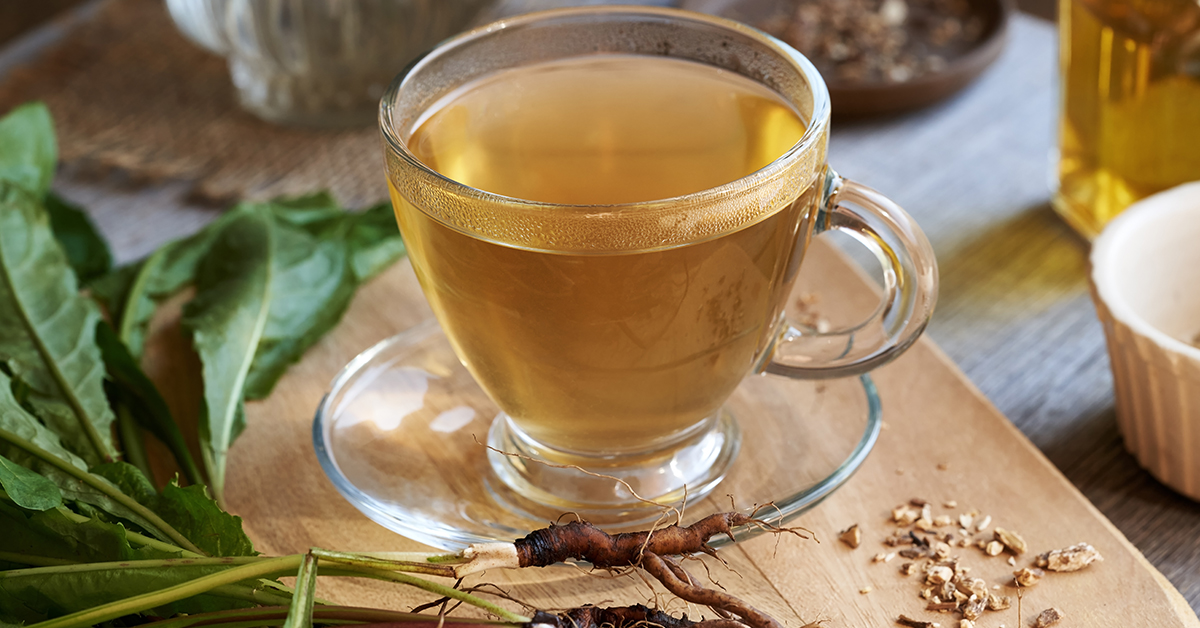
Gentle Liver Support Tea
Ingredients:
- 1 teaspoon dried dandelion root
- 1 teaspoon dried burdock root
- 1/2 teaspoon dried ginger root
- 1 cup of boiling water
Preparation:
- Combine all herbs in a teapot.
- Add boiling water and steep for 10-15 minutes.
- Strain and drink once daily, preferably in the morning, to gently support liver function.
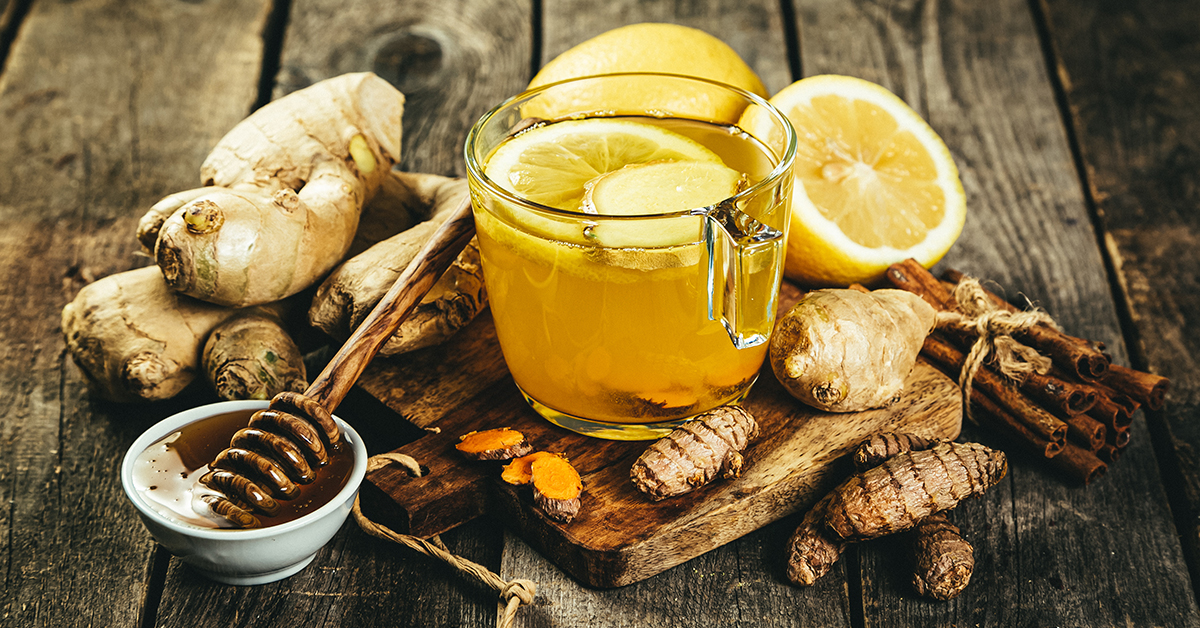
Turmeric-Ginger Liver Tonic
Ingredients:
- 1 teaspoon dried turmeric root
- ½ teaspoon dried ginger root
- 1/2 teaspoon dried dandelion root
- 1 cup of boiling water
- Pinch of black pepper (to enhance turmeric absorption)
Preparation:
- Mix the herbs in a teapot.
- Pour boiling water over the herbs, add a pinch of black pepper, and steep for about 10 minutes.
- Strain and drink twice daily to help reduce inflammation and support liver health.
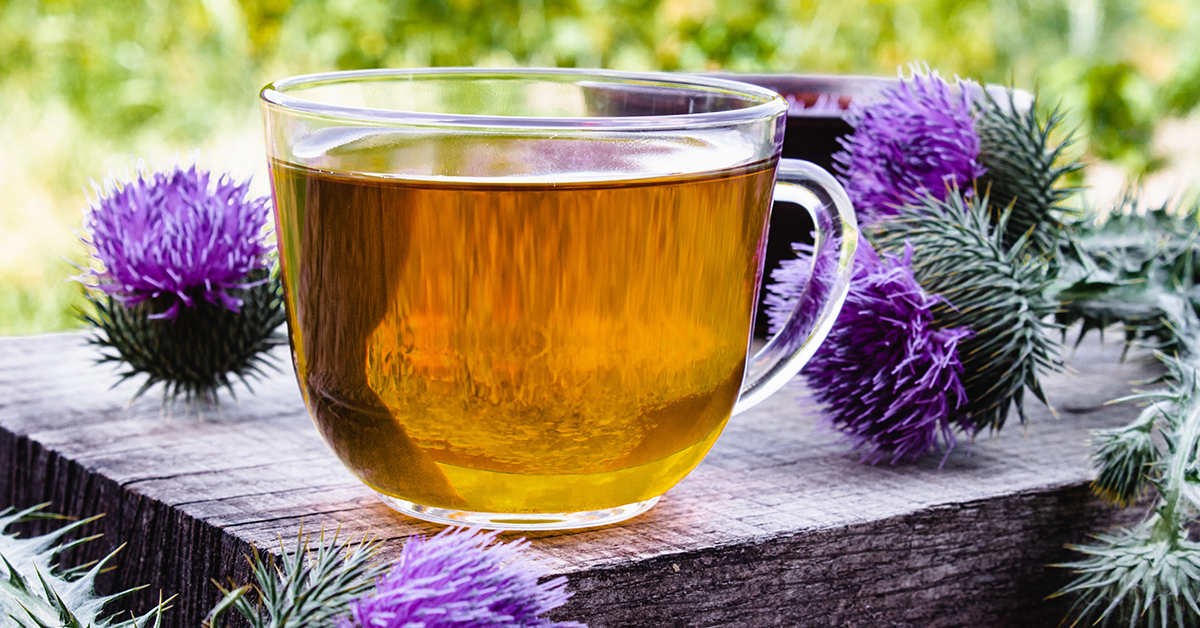
Milk Thistle Liver Cleanse Blend
Ingredients:
- 1 teaspoon milk thistle seeds (crushed)
- 1 teaspoon dried dandelion root
- 1/2 teaspoon dried burdock root
- 1/2 teaspoon dried ginger root
- 1 cup of boiling water
Preparation:
- Crush milk thistle seeds in a mortar and pestle.
- Combine with other herbs in a teapot.
- Add boiling water and steep for 15 minutes.
- Strain and drink once daily to support liver detoxification.
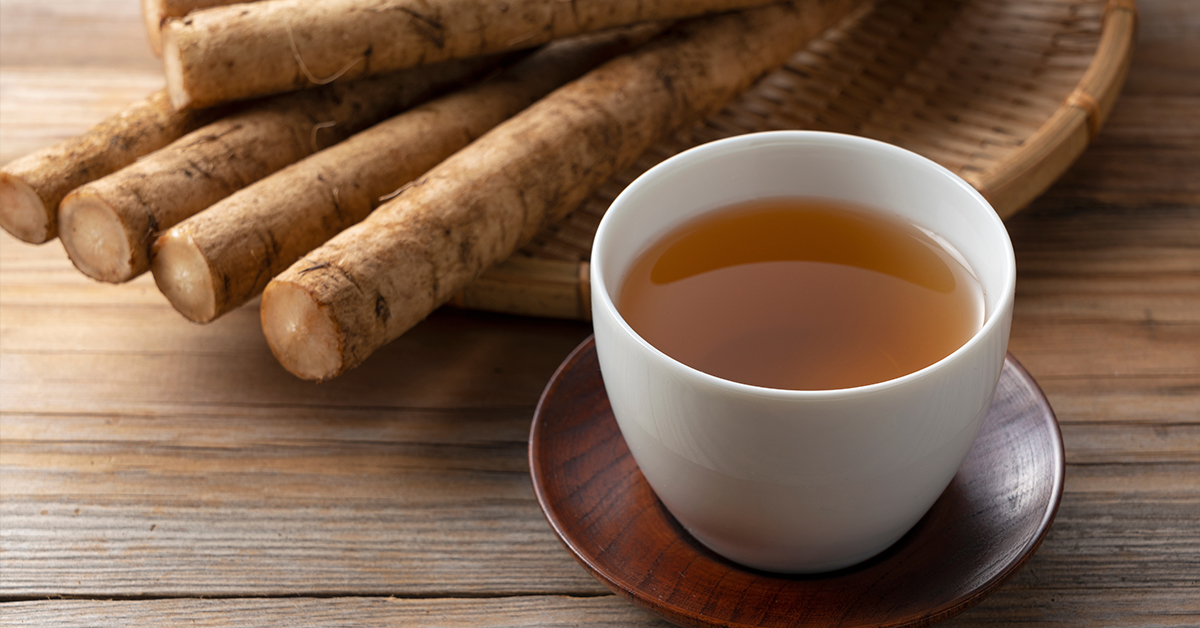
Liver Rejuvenation Infusion
Ingredients:
- 1 teaspoon milk thistle seeds (crushed)
- 1 teaspoon dried turmeric root
- 1/2 teaspoon dried dandelion root
- 1/2 teaspoon dried burdock root
- 1/4 teaspoon dried ginger root
- 1 cup of boiling water
Preparation:
- Crush milk thistle seeds.
- Combine all herbs in a teapot, add boiling water, and steep for 15 minutes.
- Strain and drink once daily to support overall liver health and potentially reduce fat accumulation.
These herbal blends are designed to be integrated into a daily routine, offering a practical approach to supporting liver health naturally. Adjust the blends according to personal taste preferences, and always start with smaller amounts to test for any potential sensitivities.
☯️ Integrating Herbs into Daily Life for Fatty Liver Support
Incorporating herbs into your daily routine can support liver health and may help manage fatty liver disease. Here are some practical tips for using herbs effectively and complementary practices to maximize their benefits.
Daily Use and Lifestyle Integration
- 🫖 Herbal Teas: Start your day with a cup of Gentle Liver Support Tea or Turmeric-Ginger Liver Tonic. This morning ritual can help set a positive tone for liver health throughout the day. Consider having another cup in the afternoon or evening, such as the Milk Thistle Liver Cleanse Blend.
- 💚 Herbal Supplements: If you prefer not to drink herbal teas, consider taking milk thistle, turmeric, or dandelion root in capsule or tincture form. These can be taken with meals to improve absorption.
- 🫚 Culinary Uses: Incorporate turmeric and ginger into your cooking. Add these herbs to soups, stews, or stir-fries for flavor and potential health benefits. You can also make a turmeric latte or golden milk as a soothing evening drink.
Additional Practices to Support Liver Health
- 🍎 Dietary Adjustments: Focus on a diet rich in fruits, vegetables, whole grains, and lean proteins. Reduce intake of processed foods, sugary drinks, and alcohol. Add liver-friendly foods like garlic, leafy greens, and walnuts to your meals.
- 🏃♀️ Regular Exercise: Engage in moderate physical activity, such as brisk walking, swimming, or cycling, for at least 30 minutes most days of the week. Regular exercise can help reduce liver fat and improve overall liver function.
- 🧘♀️ Stress Management: Practice stress-reduction techniques like deep breathing, meditation, or yoga. While chronic stress may affect overall health, its direct impact on liver health is still being studied.
- 🫗 Hydration: Drink plenty of water throughout the day. Proper hydration supports overall liver function and general health.
- 🚴 Weight Management: If overweight, aim for gradual weight loss through healthy eating and regular exercise. Even modest weight loss can significantly improve liver health in fatty liver disease.
Integrating these herbal remedies and lifestyle practices can create a comprehensive approach to supporting liver health and potentially managing fatty liver disease. Start with smaller doses of herbs to see how your body reacts. If you have existing health conditions or are taking medications, consult a healthcare provider before starting any new herbal regimen.
🌱 Navigating Herbs Safely
Starting with small doses is the first step when adding herbal remedies to your health routine. This approach lets you see how you respond and adjust amounts for the best effect, keeping safety in mind. While many herbs are safe, everyone’s body reacts differently. If you notice any side effects, it’s important to stop and think about what might be causing them.
Remember, herbs can sometimes interact with prescription medicines. These interactions might make your medicines work too well or not well enough, which is why talking to a healthcare provider or an herbalist is essential. This is especially crucial if you’re pregnant, breastfeeding, taking medications regularly, or have an existing health condition. Getting advice tailored to your situation can help you avoid any unnecessary risks.
For kids and older adults, being extra careful with herbs is important. Their bodies might react more strongly to herbal remedies, and the chance of side effects or interactions could be greater. Before giving herbal treatments to children or elderly family members, getting advice from a professional is a must to ensure their safety.
By being cautious and seeking expert advice when needed, you can make herbal remedies a safe part of your wellness plan. This careful approach allows you to enjoy the benefits of herbs while keeping yourself and your family safe.
Turmeric and milk thistle show promise in reducing liver fat accumulation and inflammation. Dandelion root may help with detoxification and fat breakdown. Ginger could improve insulin sensitivity and reduce liver enzymes. Burdock root may support overall liver health through its antioxidant properties.
While these herbs show potential, it’s important to note that more research is needed to fully establish their effectiveness in treating fatty liver disease. It’s recommended to consult with a healthcare provider before starting any new herbal regimen, especially for those with existing health conditions or taking medications.
FAQ
Can herbs really help with fatty liver disease?
Certain herbs show promise in supporting liver health and may potentially help with fatty liver disease. Turmeric, milk thistle, dandelion root, ginger, and burdock root have been studied for their liver-protective properties. These herbs contain compounds that may help reduce inflammation, support liver health, and improve liver function. For example, curcumin in turmeric has anti-inflammatory and antioxidant effects, while silymarin in milk thistle may help regenerate liver cells. However, it's important to note that while research is promising, more large-scale human studies are needed to fully establish the effectiveness of these herbs in treating fatty liver disease. Herbs should be part of a comprehensive approach that includes a healthy diet, regular exercise, and medical supervision.
How long does it take to see results when using herbs for fatty liver?
The time it takes to see results from using herbs for fatty liver varies significantly based on factors like the severity of the condition, overall health, lifestyle habits, and consistency in herb use. However, without significant lifestyle changes, the impact of herbs alone may be limited. Generally, it may take several weeks to months of regular use before any improvements in liver function or symptoms are observed. Some studies on milk thistle have shown improvements in liver function tests, such as reductions in ALT and AST levels, after 8-12 weeks of consistent use. However, it's crucial to understand that herbs are not a standalone solution. They work best when used consistently and with lifestyle changes like a healthy diet and regular exercise. It's also important to have regular check-ups with a healthcare provider to monitor liver function and overall health progress.
Are there any risks or side effects associated with using herbs for fatty liver?
While herbs are generally considered safe for most people, they can have side effects and interact with medications. For example, milk thistle may cause digestive upset in some people, and turmeric can act as a blood thinner. Dandelion root may interact with certain medications, especially diuretics, and may have mild interactions with blood thinners. Ginger can interfere with diabetes medications and blood thinners. It's crucial to consult with a healthcare provider before starting any herbal regimen, especially if you have existing health conditions or are taking medications. They can help determine whether these herbs are appropriate for you and monitor for potential interactions or side effects. Additionally, the quality and purity of herbal supplements can vary, so choosing products from reputable sources is important. Remember, herbs should complement, not replace, conventional medical treatment for fatty liver disease.

